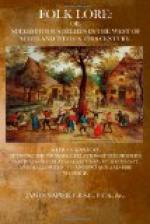Employment of certain charms to influence for good or evil prevailed in this century to a great extent. Some of these it is difficult to trace to their origin. About forty years ago, a certain married couple lived unhappily together. The wife did all she could to make her husband comfortable, but still he abused her without cause. At length, after suffering much, she applied to a woman who professed to have power over the affections, and for this purpose prepared love philters. The woman gave her a charm, which was to be sewn between the lining and cloth of her husband’s vest without his knowledge. She carried these instructions out, and with extraordinarily successful results, for, while the husband wore this vest, he never gave her so much as an angry word.
One Walter Donaldson was in the habit of beating his wife, and making her life bitter. She made application to Isabell Straguhan, who possesses magic influences, who took pieces of paper and sewed them thick with thread of divers colours, and put them in the barn among the corn. From that time forth the said Walter never lifted hand against his wife, nor did once find fault with her whatsoever she did, and was entirely subdued to her love.
The following was related to me as a fact, by a person who said that he tried it:—There is a certain crooked bone in a frog, which, when cleaned and dried over a fire on St. John’s eve, and then ground fine and given in food to any person, will win the affections of the receiver to the giver, and in young persons will produce a desire for each other’s society, culminating eventually in marriage; also, when a married couple do not agree well together, it will reconcile them, and bring about a mutual affection.
At the commencement of this century, belief in the influence of the mandrake plant over the affections still existed in this country. Belief in this plant is as old as history. Leah, the neglected wife of Jacob, doubtless intended to influence her husband by the use of it, whilst Rachel procured the plant for a different purpose, but for both purposes it was considered efficatious, and in both cases, the narrative shows, successful. By both eastern




